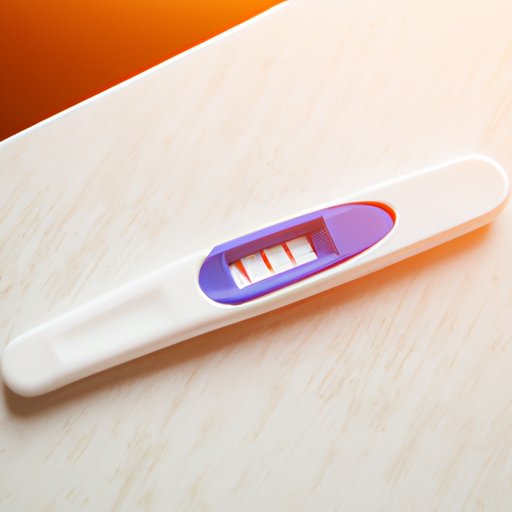
I. Introduction
Whether you’re planning to start a family or simply experiencing unusual symptoms, pregnancy testing can provide answers and peace of mind. In this article, we’ll explore the early signs of pregnancy, why testing is important, and provide a comprehensive guide to taking a pregnancy test.
II. Top 5 Signs That You Should Take a Pregnancy Test
The most common signs of early pregnancy include missed periods, nausea or vomiting, fatigue, bloating or cramping, and changes in appetite or mood. If you’re experiencing any of these symptoms, it’s important to take a pregnancy test to confirm whether or not you’re pregnant.
A missed period is typically the first sign of pregnancy, as it occurs when the fertilized egg implants itself in the uterus and causes hormonal changes. Nausea and fatigue are also common symptoms of early pregnancy, as the body adjusts to the changes in the reproductive system. Cramping or bloating may also occur as the uterus expands to accommodate the growing fetus, while changes in appetite and mood may be related to hormonal fluctuations.

III. Why You Should Take a Pregnancy Test Sooner Than Later
Early detection of pregnancy is important for a number of reasons. First, it allows you to make informed decisions about your health and wellbeing, and begin prenatal care as soon as possible. This can help ensure a healthy pregnancy and reduce the risk of complications. It also gives you time to plan for the future, whether that means preparing financially, making lifestyle changes, or simply adjusting to the idea of having a baby.
Early detection is also important for more practical reasons, such as avoiding unnecessary exposure to harmful substances or behaviors. For example, if you’re a smoker or heavy drinker, early detection can help you quit these habits and reduce the risk of harm to your baby.
IV. The Ultimate Guide to Taking a Pregnancy Test: What You Need to Know
There are two main types of pregnancy tests: at-home tests and medical tests. At-home tests are readily available over-the-counter at drugstores or online, while medical tests are usually performed by a doctor or healthcare provider.
Both types of tests work by detecting the presence of the hormone human chorionic gonadotropin (hCG) in your urine or blood. This hormone is produced by the placenta shortly after a fertilized egg implants itself in the uterus.
To take an at-home pregnancy test, you’ll need to collect a sample of your urine and use a dropper to apply a small amount of urine to the testing strip or device. You’ll then need to wait a few minutes for the results to appear, which will typically show either one or two lines, indicating whether or not you’re pregnant.
It’s important to follow the manufacturer’s instructions carefully when taking an at-home pregnancy test, as this can affect the accuracy of the results. It’s also important to use the test in the morning, when your urine is most concentrated, to increase the likelihood of accurate results.
V. At-Home vs. Medical Pregnancy Tests: Which Are More Accurate?
Both at-home and medical pregnancy tests are highly accurate when used correctly. However, medical tests are generally considered more reliable, as they use more sensitive equipment and can detect lower levels of hCG in your blood or urine.
Medical tests also offer the added benefit of professional guidance and support, which can be particularly helpful if you have questions or concerns about your results.
VI. What to Do After Taking a Pregnancy Test: Next Steps and Tips
If your pregnancy test is positive, congratulations! You’re likely feeling a range of emotions, from excitement and joy to fear and anxiety. It’s important to take care of yourself during this time, which may include seeking prenatal care, making healthy lifestyle choices, and preparing for the future.
If your pregnancy test is negative, don’t panic. False negatives can sometimes occur, particularly if you take the test too early or don’t follow the instructions carefully. If you’re still experiencing symptoms or have concerns, it’s important to seek medical advice to rule out other potential causes.
VII. Debunking Common Pregnancy Test Myths and Misconceptions
There are several common misconceptions about pregnancy tests that can lead to confusion or misinformation. For example, some people believe that you need to wait a certain amount of time after having sex to take a pregnancy test, or that taking multiple tests will increase your chances of getting accurate results.
In reality, these myths are largely unfounded. The best time to take a pregnancy test is as soon as you suspect you may be pregnant, regardless of the timing of your last sexual encounter. Similarly, taking multiple tests is unlikely to increase the accuracy of your results, as long as you follow the manufacturer’s instructions carefully and use the test at the right time.
VIII. How Often Should You Take a Pregnancy Test: Experts Weigh In
Experts generally recommend waiting at least a week after a missed period before taking a pregnancy test, as this allows enough time for the hCG hormone to accumulate in your body. However, there is no specific guideline for how often you should take a pregnancy test, as this will depend on your individual circumstances.
If you suspect you may be pregnant but receive a negative result, it’s typically recommended to wait a few days and try again. However, if you experience unusual symptoms or have concerns about your results, it’s always best to seek medical advice.
IX. Conclusion
Pregnancy testing is an important and often emotional process, whether you’re trying to start a family or simply seeking answers about your health. By understanding the signs of early pregnancy, taking a test as soon as possible, and using reliable testing methods, you can make informed decisions and feel confident in your results.




